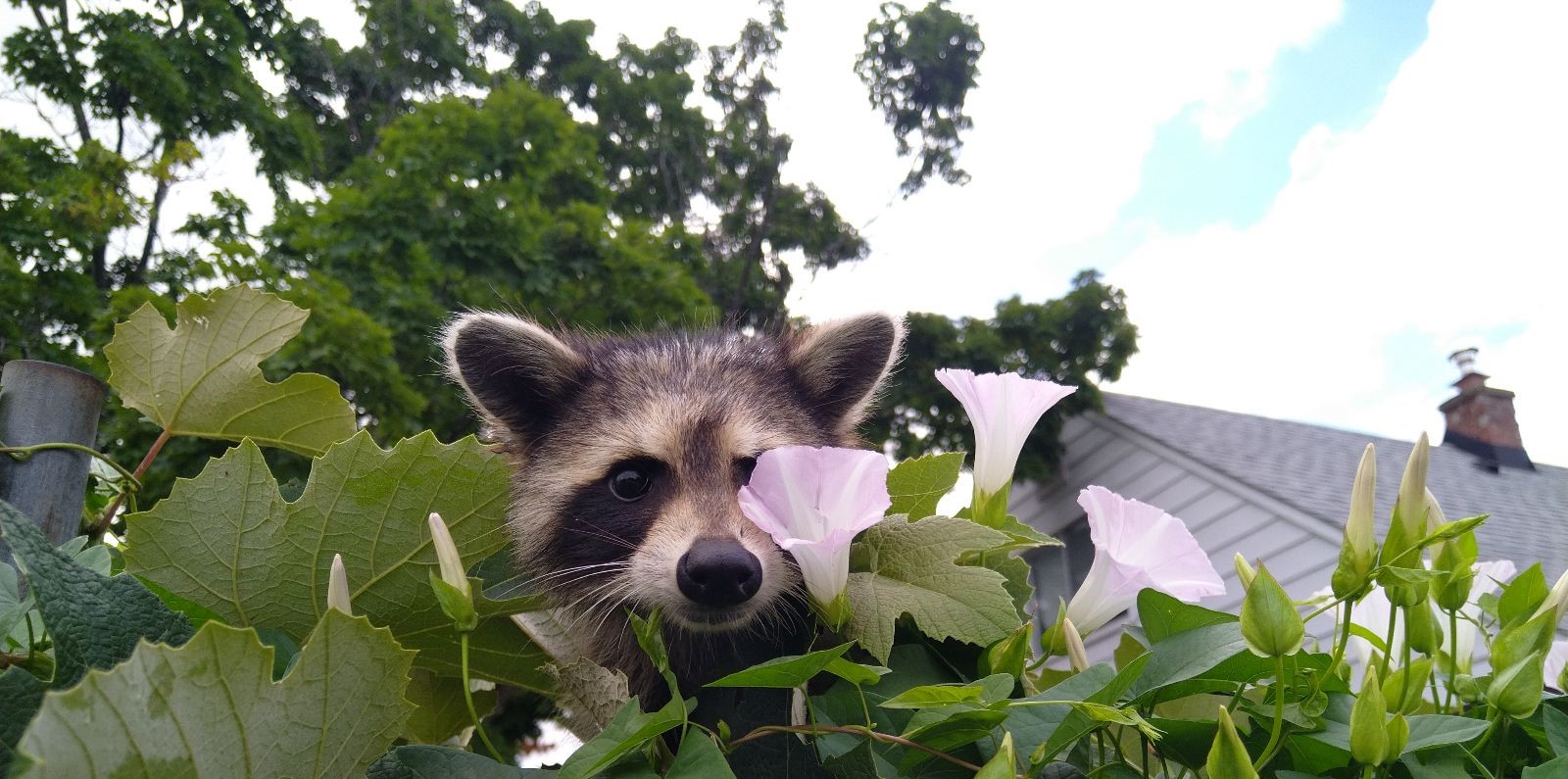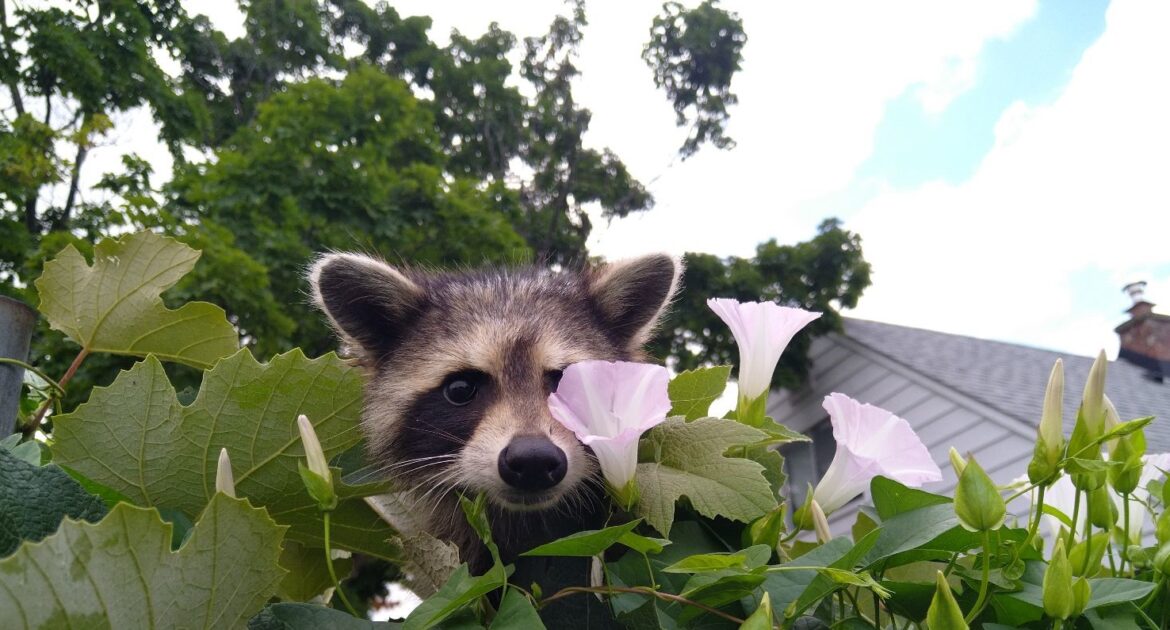If you’ve been struggling to protect your crops or flowers from raccoons, you’re not alone. These clever animals are an all-too-common sight in Hennepin County, from the streets near Bde Maka Ska to neighborhoods throughout the area. Left unchecked, they can dig up your flower beds, help themselves to your crops, and create a mess of your outdoor spaces. But the good news is, there are humane raccoon deterrents for garden maintenance that will help keep raccoons out of your garden in Plymouth while keeping your conscience clear.
Below, we share practical raccoon-proof garden tips to help you reclaim your space.
Humane Raccoon Deterrents for Garden Use
The first step in protecting your garden is to make it less inviting to raccoons. Here are some humane methods for discouraging them from visiting your backyard.
- Eliminate Food and Water Sources: Raccoons are opportunistic feeders. Remove food sources like leftover pet food, accessible trash cans, or fallen fruit from trees. Bring pet bowls indoors overnight, and be sure to secure your trash can lids tightly. For gardens, dust vegetables with substances like baby powder or blood meal—natural deterrents that raccoons dislike.
- Protect Crops With Coverings: For small gardens, you can use mesh or row covers to protect vegetables. Cover corn ears and melons with mesh bags, securely sealing them to keep curious raccoons away. This physical barrier ensures that ripe produce remains safe.
- Use Motion-Activated Deterrents: Install motion-activated sprinklers or lights in your garden. Sudden bursts of water or bright lights can scare raccoons away without causing them any harm.
- Adjust Bird Feeder Placement: Raccoons often raid bird feeders for seeds and nuts. Place feeders on poles with baffles to prevent raccoons from accessing them, and clean up spilled seeds regularly.
These simple adjustments can go a long way in preventing raccoons from making your garden their buffet.
Keep Raccoons Out of Garden With Effective Fencing
For long-term prevention, a solid fence can be the ultimate solution. However, raccoons are smart and agile, so your fencing needs to be designed to stop them in their tracks.
Fence Construction Tips:
- Height and Material: Use heavy-duty materials like welded wire or hardware cloth. The fence should be at least 4 feet tall since raccoons are excellent climbers.
- L-Shaped Buried Barrier: Prevent raccoons from digging under the fence by installing an L-shaped barrier at the bottom. Bend the wire fencing outward and bury it a few inches deep to stop their digging efforts.
- Electric Enhancements: For more persistence, incorporate a single electrified wire along the top of the fence line. This delivers a harmless yet effective deterrent when they attempt to climb.
- Prevent Tree Access: Trim overhanging tree branches near your garden to prevent raccoons from using them as a bridge.
By combining these strategies, you can create a protective barrier that keeps raccoons from reaching your prized plants.
Raccoon-Proof Garden Tips Using Landscaping Solutions
Believe it or not, how you design your garden plays a significant role in deterring raccoons. Certain plants, layouts, and maintenance practices can make your garden less appealing.
- Plant Repellents: Certain plants, like lavender, garlic, and marigolds, have strong scents that raccoons dislike. Incorporate these into your garden to act as natural deterrents.
- Avoid Dense Vegetation: Clear out overgrown bushes or cluttered areas. Raccoons often use these as hiding spots. Keeping the landscape open reduces their sense of security.
- Rock Mulch and Gravel: Instead of bark mulch, use coarse gravel or rocks. Raccoons dislike walking on sharp or uncomfortable surfaces.
- Maintain Cleanliness: A well-maintained garden is less likely to attract unwanted visitors. Clear out debris, fallen fruit, and any potential hiding spots to discourage loitering.
These straightforward adjustments can transform your garden into a space that raccoons prefer to avoid.
Raccoon-Proofing for Plymouth Residents
Living in Hennepin County, we know firsthand the challenges these animals can present. From robbing backyard crops to raiding compost bins near local landmarks like the Midtown Global Market, raccoons thrive in urban and suburban settings. While humane deterrents and garden management techniques go a long way, there are unique considerations for our community.
- Seasonal Awareness:
During spring and summer, mother raccoons are highly active, searching for food sources while raising their young. This makes it especially important during these months to secure your garden and eliminate easy opportunities for them.
- Local Landscaping Norms:
Minnesota’s weather offers unique challenges. Be sure your garden fencing and other deterrents are weatherproof and can withstand cold winters or rainy seasons.
- Community Action:
Work with your neighbors to address raccoon prevention. If one property is an easy target, it can make surrounding gardens more vulnerable.
A collective approach across neighborhoods can strengthen local defenses against raccoons.
Actionable Raccoon Deterrents to Try Today
If raccoons are proving persistent, there are several proactive measures you can take to keep them away from your property. One effective strategy is to install metal baffles on the trunks of trees, especially fruit-bearing ones, to prevent raccoons from climbing and accessing their food source. Another approach is to control lawn grubs, which are a favored food for raccoons. This can be achieved by treating your lawn with beneficial nematodes or milky spore, both of which help to eliminate grubs naturally and safely.
It’s also essential to seal any potential entry points raccoons might exploit while searching for shelter, such as gaps around sheds, garages, and decks. These areas often serve as ideal hiding spots for them, so thorough inspections and sealing are crucial. Additionally, some gardeners report success with homemade repellents, such as sprinkling cayenne pepper around the garden perimeter, to deter raccoons from venturing onto their property.
Combining these tactics with fencing, strategic landscaping, and other deterrent strategies can create a well-rounded plan to keep raccoons at bay. These measures not only help protect your garden and property but also ensure a balanced and humane approach to dealing with wildlife.
Why Trust Skedaddle’s Humane Raccoon Removal Services
At Skedaddle, we understand the importance of addressing wildlife intrusions in a way that is both effective and compassionate. Our humane raccoon removal services prioritize the safety and well-being of both homeowners and the raccoons involved. With over three decades of experience in urban wildlife management, we’ve developed an approach that ensures long-lasting results while respecting the delicate balance of nature.
- Conduct a thorough property inspection to assess raccoon activity and identify entry points.
- Implement advanced exclusion techniques to seal access points.
- Use custom-designed barriers to prevent raccoons from re-entering.
- Ensure all methods are humane and do not harm the animals.
If there are raccoons currently occupying your property, we carefully and strategically remove them, paying close attention to any babies or dependent young, especially during breeding season. Our trained wildlife specialists make use of humane handling techniques to safely relocate the animals to suitable habitats far from your home.
- Property restoration services to repair raccoon damage
- Decontamination of affected areas
- Reinforcement of vulnerable spots to prevent future issues
- Comprehensive solutions for a secure property and restored peace of mind
When it comes to humane raccoon removal, Skedaddle is committed to providing reliable, service-oriented solutions that protect both your home and local wildlife.
Win Back Your Garden With Confidence
Protecting your garden in humane ways ensures harmony between humans and local wildlife. By removing food sources, employing physical barriers, and maintaining a raccoon-proof garden design, you set yourself up for success without causing harm to these resourceful animals. If you’re in Hennepin County and need more tailored advice or professional help, reach out to us at Skedaddle. Together, we’ll create a safe and thriving outdoor space—one that stays yours. Your plants will thank you.




